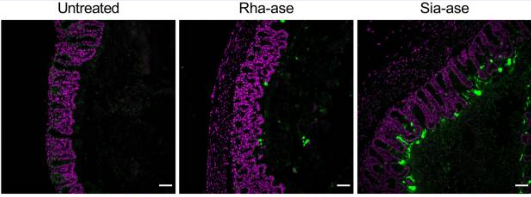A group from Institute of Physiology, University of Zurich, Zurich, Switzerland, etc. has reported that increase of intestinal bacterial sialidase activity exacerbates acute colitis in mice.
https://www.ncbi.nlm.nih.gov/pmc/articles/PMC9780602/
The gut microbiota mainly consists of the phyla Bacteroidetes and Firmicutes, while members of Actinobacteria, Verrucomicrobia, Fusobacteria and Proteobacteria represent a minor fraction. The gut microbiota plays a vital role in human health, supplying essential nutrients, training the immune system, and helping to protect against pathogens. The gut microbiota is also involved in the host metabolism and has been linked to a variety of chronic diseases.
Gut microbes express a multitude of genes, including a vast group of carbohydrate-active enzymes, which are required to digest complex oligo- and polysaccharides. In addition to digesting dietary carbohydrates, these enzymes are also active on the thick mucus layer lining intestinal surfaces. The cleavage of host glycans by bacterial GHs may also alter carbohydrate structures involved in cell adhesion, trafficking and activation. Especially fucosylated and sialylated epitopes are recognized by endogenous lectins, such as selectins and siglec, which regulate leukocyte trafficking and activation, respectively.
To investigate the impact of bacterial glycoside hydrolase activities on the gut microbial composition and on host glycans during colon inflammation, local glycoside hydrolase activity was promoted by supplementing mice developed acute colitis with recombinant E. coli expressing specific sialidase, fucosidase and rhamnosidase enzymes. Interestingly, whereas increased fucosidase and rhamnosidase activity did not alter the course of colitis, increased sialidase activity exacerbated disease severity.
Of note, the microbial composition of mice gavaged with recombinant E. coli expressing specific sialidase, fucosidase and rhamnosidase enzymes had little changes in the gut microbiota composition.
On the other hand, it was found that the sialic acid on mucosal glycans and also on resident leukocytes in the colon mucosa was cleaved from PNA stainning and siglec ligand staining experiments.
 PNA staining in proximal colon
PNA staining in proximal colon
As a conclusion, the remodeling of surface sialylation caused by increased sialidase activity could account for the observed exacerbation of acute colitis in mice due to down-regulate activation of immune cells.
